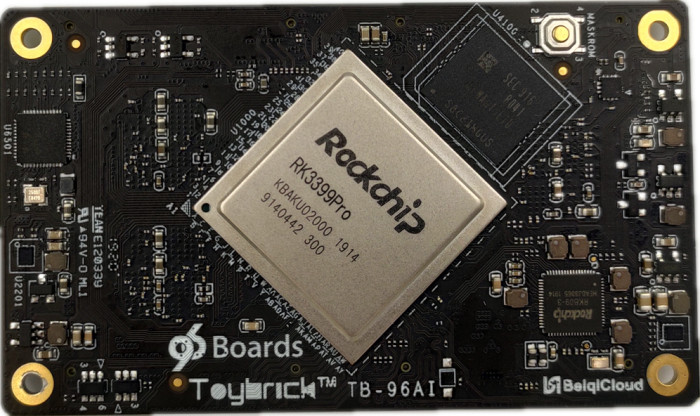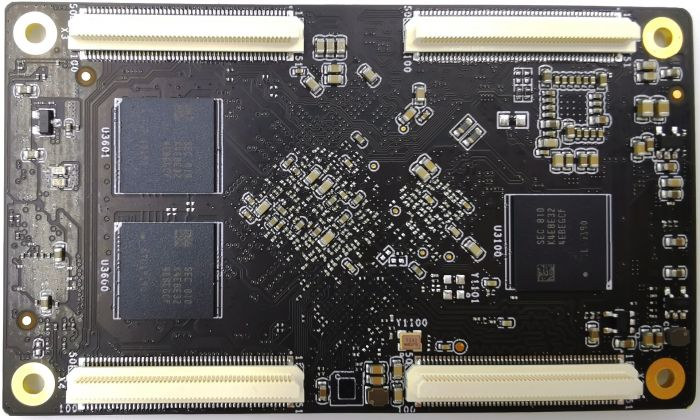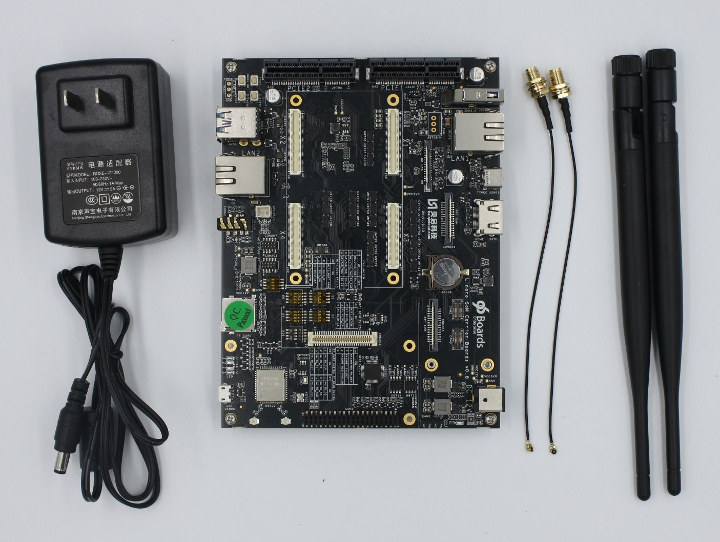Back in April, we covered the very first 96Boards SoM’s (Systems-on-Module) which were based on Rockchip RK3399Pro or RK1808 processors, and targeted applications leveraging artificial intelligence acceleration.
There were not quite available at the time, but Seeed Studio now has both BeiQi modules for pre-order for $119 and $59 respectively, while the carrier board goes with $125 with antennas, and power supply. Note that the RK3399Pro SoM and the carrier board are basically available now with shipping schedule for July 4th, but you’d had to wait until the end of the month for the RK1808 module.
BeiQi RK1808 AIoT 96Boards Compute SoM
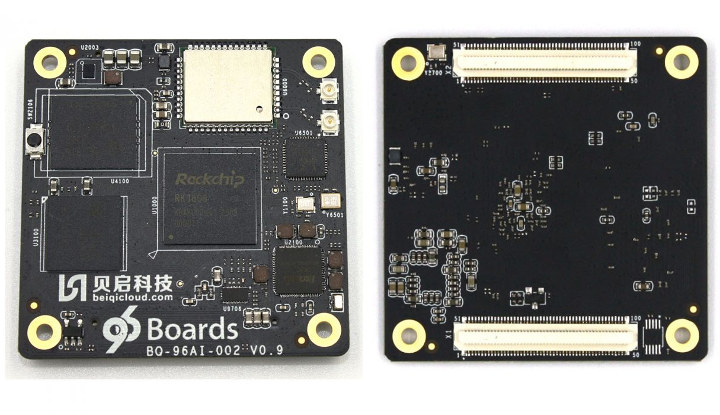
Module specifications:
- SoC – Rockchip RK1808 dual-core Arm Cortex-A35 processor @ 1.6 GHz with NPU supporting 8-bit/16-bit operations up to 3.0 TOPS, TensorFlow and Caffe frameworks; 22nm FD-SOI process
- System Memory – 1GB LPDDR3 (I also read “4GB LPDRR3” (sic.) in other places, but the capacity is likely wrong)
- Storage – 16GB eMMC flash
- Networking – Gigabit Ethernet PHY/transceiver, built-in WiFi/BT module plus 2x u.FL connectors
- Video
- Decoder – H.264/AVC BASE/MAIN/HIGH @ LEVEL4.2 up to 1920×1080 @ 60fps
- Encoder – H.264 BP/MP/HP @ 4.2 level up to 1920×1080 @ 60fps (or 30 fps depending where you read)
- 2x 100-pin connectors (X1/X2) with
- Storage – SD Card I/F
- Display – 1x MIPI DSI interface up to 1080p60
- Camera interface – 1x MIPI-CSI, ISP image processor supporting up to 1920×1080 resolution
- Audio – 1x Speaker, 1x headphone, 1x Mic, 1x I2S
- Networking – Gigabit Ethernet
- USB – 1x USB2.0 host, 1x USB 3.0 Type-C
- 1x PCIe x4
- 3x I2C, 1x SPI, 1x PWM, 1x GPIO
- 2x ADC, one for key input and the other for headphone insertion detection
- 1x UART Debug
- Misc – MaskRom button
- Power Supply – 5V; RK809-2 PMIC; 3.3V, 1.8V signals are also exposed through X1 connector
- Dimensions – 50 x 50 mm
The module supports Linux as well as Tensorflow and Caffe frameworks. Details about the specifications are all over the place as the official product page has some discrepancies with info released on Seeed Studio.
BeiQi RK3399Pro AIoT 96Boards Compute SoM
Specifications:
- SoC – Rockchip RK3399Pro hexa-core processor with 2x Cortex-A72 up to 1.8GHz, 4x Cortex-A53 up to 1.4GHz, Arm Mali-T860 MP4 GPU with support for OpenGL ES1.1/2.0/3.0/3.1, OpenVG1.1, OpenCL, DX11, NPU supporting 8bit/16bit operation up to 3.0TOPS
- System Memory – 3GB LPDRR3 (CPU 2GB + NPU 1GB)
- Storage – 16GB eMMC flash
- Networking – Gigabit Ethernet PHY
- Video
- Decode – 4K VP9 and 4K 10bits H265/H264 video decoding, up to 60fps, 1080p multi-format video decoding (WMV, MPEG-1/2/4, VP8)
- Encode – 1080p video encoding with H.264 or VP8
- 4x 100-pin connectors (X1/X2/X3/X4) with
- Storage – SDMMC for SD card
- Networking – Gigabit Ethernet
- Display Interface – MIPI-DSI, eDP, DP, HDMI up to 4K @ 60 Hz
- Camera Interface – 2x MIPI-CSI, dual ISP support up to single 13MP or dual 8MP camera
- Audio
- I2S0 – User extended use
- I2S1 – 1x speaker, 1x headphone, 1x Mic
- I2S2 – HDMI interface audio output; DP interface audio output;
- USB
- USB 3.0 Type-C OTG interface with DisplayPort 1.2 Alt mode
- 1x USB 3.0 port internally connected to NPU
- 2x USB 2.0 host
- 1x SPI, 3x UART (including one for CPU Debug, one for NPU Debug), 6x I2C, 1x SDIO, 2 PWM
- 1x PCIe x4
- 3x ADC – One for buttons, one for headset microphone detection, and one for user-definable use
- GPIOs
- Misc – MaskRom button
- Power Supply – 5V; RK809-3 PMIC
- Dimensions – 80 x 50 mm
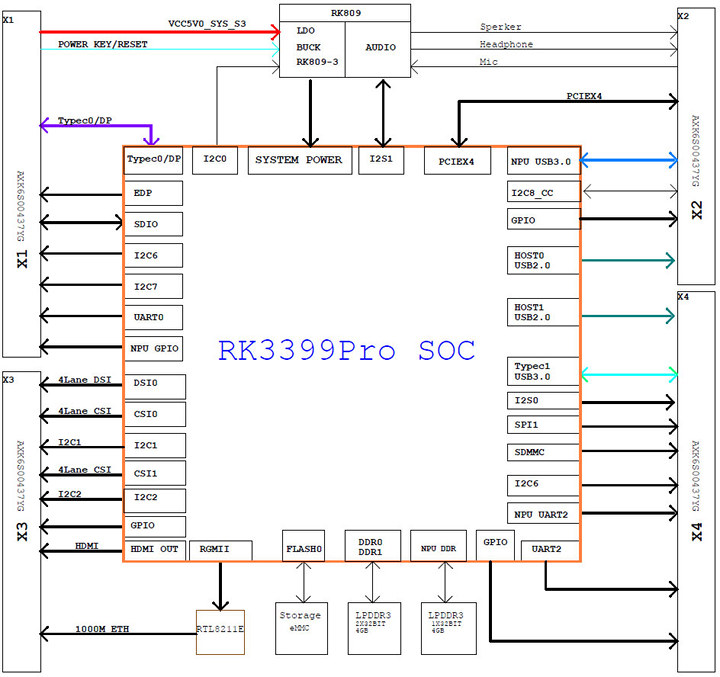
The RK3399Pro SoM supports both Linux and Android, and like RK1808 supports Caffe/Mxnet/TensorFlow frameworks.
Development tools, PC-based model conversion, performance estimation, and accuracy verification are provided for the module, as well as an SDK with support for Android NN API, RKNN cross-platform API, and Linux based TensorFlow development. You’ll find the tools in the official Rockhip Github account.
BeiQi Carrier Board for RK1808/RK3399Pro
The modules would be pretty useful without a baseboard, so the company also provides BeiQi carrier board kit with the board exposing the following key features/ports:
- SoM Support – 4x 100-pin Panasonic sockets for RK1808 and RK3399Pro modules described above
- Storage – MicroSD card slot
- Display
- Raspberry Pi MIPI LCD Connector
- eDP for TB-96AI RK3399Pro SoM
- MIPI connector for TB-96AIoT RK1808 SoM
- Camera Interface
- 4-lane MIPI CSI2 for MIPI_RX1 in TB-96AI RK3399Pro SoM
- Raspberry Pi Camera Connector for MIPI_RX0 in TB-96AI RK3399PRO SoM
- 4-lane MIPI CSI3 for MIPI_RX in TB-96AIoT RK1808 SoM
- Audio – 8Ω1W speaker header, 3.5mm earphone jack
- Networking
- 1x Gigabit Ethernet for TB-96AI RK3399Pro SoM
- 1x Gigabit Ethernet for TB-96AIoT RK1808 SoM
- Ampak AP6356S module with dual-band WiFi and Bluetooth; WiFi/BT antenna connector
- USB
- 1x USB 3.0 for TB-96AI RK3399Pro
- 1x USB 3.0 for TB-96AI RK3399Pro / 1x USB 2.0 for TB-96AIoT RK1808 SoM
- Expansion
- 2x PCIe x4 sockets
- 96Boards Mezzanine LS and HS connectors
- mPCIe socket + SIM card for cellular connectivity module
- CAN interface
- Debugging – 10-pin MCU JTAG header, 10-pin AP JTAG, micro USB port with FT232RL USB-UART chip
- Misc – RTC battery holder, fan connector, reset & power keys, 2x user key, user LED, system LED
- Power Supply – 12V/2A via 5.5mm DC jack
- Dimensions – 160 x 120 mm
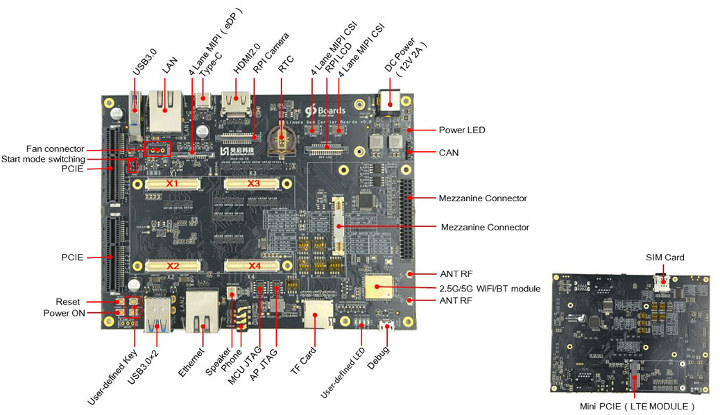
While I appreciate the efforts of using a single carrier board for two different types of modules, it will lead to confusion as while some ports are shared, others are specific to one type of 96Boards system-on-module. For example, while there are two Gigabit Ethernet ports on the board, I understand only one can be used with a given module. TB-96AIoT RK1808 already have a WiFi & Bluetooth module, so the module on the carrier board will not be used. But I guess that’s OK for early development, as eventually custom carrier boards will have to be designed for end products. More documentation may also be found in 96Boards SoM page.
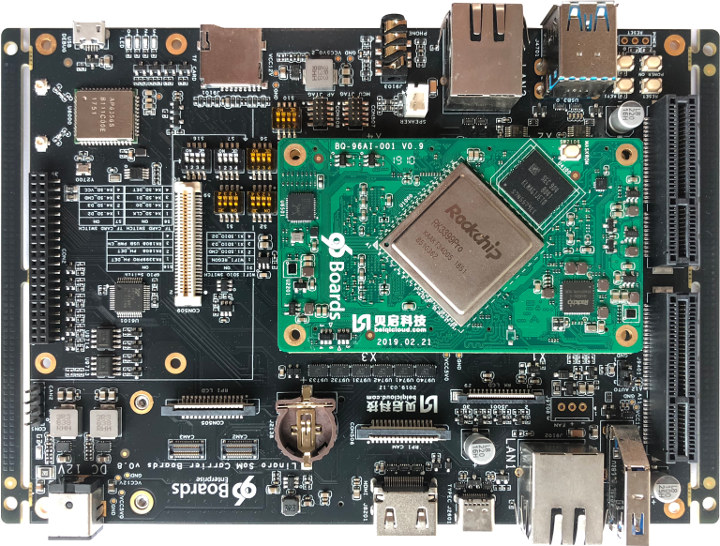

Jean-Luc started CNX Software in 2010 as a part-time endeavor, before quitting his job as a software engineering manager, and starting to write daily news, and reviews full time later in 2011.
Support CNX Software! Donate via cryptocurrencies, become a Patron on Patreon, or purchase goods on Amazon or Aliexpress


